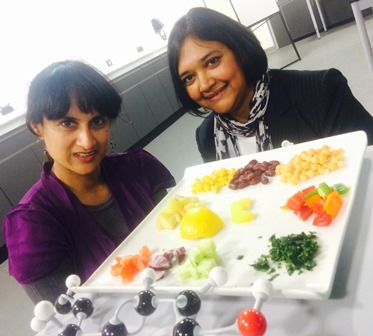Lecture curries favour with chemistry cooking display
Food Glorious Food winner, Chef Rahila Hussain helped University of Wolverhampton Professor Nazira Karodia curry favour with former students recently when she helped to explain the science behind the nation’s favourite food dish.
The Chemistry of Curry lecture looked at the essential ingredients in curry and explored the molecular reactions and medicinal benefits of spices such as cardamom, cumin, cloves, coriander, cinnamon, garlic, pepper, ginger and turmeric. At the same time, Rahila gave a practical demonstration on how to combine the ingredients to produce the flavour of curry dishes as she cooked samples of Tarka Dahl, Channa Chaat and Pilau Rice.
Professor Nazira Karodia from the Faculty of Science and Engineering at the University, said: “Our lecture about the Chemistry of Curry combines theory and practice, the light hearted and the serious - explaining the spices that make up the main ingredients in curry, focusing on the distinctive aromas and flavours of individual spices and giving an overview of the medicinal benefits of molecules found in spices.
“Traditions that use various spices and herbs in cooking have a real scientific basis. Spices have tried, tested and trusted medicinal values and can have a profound effect on general health. For example, cumin can be used to treat the common cold or digestive disorders, turmeric contains a molecule called curcumin, which has anti-inflammatory properties whilst coriander can help to relieve insomnia or anxiety.”

Former teacher, Rahila, said: “I was taught to cook by my late mother who along with my father moved from Pakistan to Huddersfield. My parents came from the Punjab which is very agricultural. Both their families had farms and so they were used to cooking with fresh fruit and vegetables and that didn’t change when they moved to Britain. It’s essential to cook curry with natural herbs and spices but the interesting thing about looking into the science behind it is finding out how some of those ingredients can actually benefit our health.”
Ndy Ekere, Dean of Faculty for Science and Engineering at the University of Wolverhampton, said: “This fascinating lecture bringing cooking and chemistry together has shown the scientific underpinning of how we can join theory together with practice to relate STEM (Science, Technology, Engineering and Maths) subjects directly to our health and well-being. It’s also been wonderful to welcome back students who have benefited from learning here and who have gone on to greater things.”
The event was attended by over 30 alumni who were treated to a taste sensation of sample curry dishes following the lecture. Aliya Hussain, former Biomedical Science (Human Biology and Pharmacology) student, 30, said: “The evening was absolutely brilliant, very amusing indeed; they brightened up the lecture not just with their cooking but with their sense of humour too. I learnt a great deal about the underlying chemistry behind curry spices and dishes and how their combinations showcased different flavours right down to their molecular and medicinal properties.”
Anyone interested in studying at the University of Wolverhampton can check out the range of courses on the website: www.wlv.ac.uk or visit us at our next Open Event on Saturday 6th February 2016.
ENDS
For more information please contact the Press Office on 01384 322736.
Notes to editors
About the University of Wolverhampton
- Based at campuses in Wolverhampton, Walsall and Telford and education centres in Stafford, Burton and Birmingham City Centre, the University has over 21,000 students and 2,400 staff. In addition, the University of Wolverhampton Science Park is home to tenant businesses and supports the development of innovative companies.
- The University welcomes students from around the world and has regional offices in China, Malaysia, India, Oman, Nigeria and Cyprus. It has a branch campus in Mauritius and courses are also delivered with global partners in China, Hong Kong, Singapore, Malaysia, India, Sri Lanka, Russia, France and Cyprus.
- It is investing £250 million over the next five years as part of the Our Vision, Your Opportunity programme. The ambitious plans to invest in education, training and economic growth include the £25 million Rosalind Franklin Science Building, the new £18 million Lord Swraj Paul business school building and the £65 million Springfield Campus, creating an international hub for construction excellence.
- The institution’s excellent teaching and learning provision, which spans sciences, creative and performing arts, education, business and management, health and wellbeing, engineering and technology, law and social sciences, ensures 95% of graduates find employment.
- Of the 13 subject areas entered in the Research Excellence Framework (REF) in 2014, all had elements graded at the highest level as being world class. The University also entered more staff and more subject areas for assessment than previously.
- In 2015 the University of Wolverhampton was awarded the highest possible accolade in the Quality Assurance Agency (QAA) higher education review. The report highlighted areas of good practice such as initiatives to raise aspirations and achievement for students and the University’s commitment to enhancing their employment prospects.
For more information please contact the Corporate Communications Team.


/prod01/wlvacuk/media/departments/digital-content-and-communications/images-2024/240328-Varsity-Line-Up-Resized.jpg)
/prod01/wlvacuk/media/departments/digital-content-and-communications/images-18-19/220325-Engineers_teach_thumbail.jpg)
/prod01/wlvacuk/media/departments/digital-content-and-communications/images-2024/240404-Digital-Humanities-Training-Resized.jpg)
/prod01/wlvacuk/media/departments/digital-content-and-communications/images-2024/240320-Uzbekistan-Resized.jpg)
/prod01/wlvacuk/media/departments/digital-content-and-communications/images-2024/240229-The-Link-Resized.jpg)
/prod01/wlvacuk/media/departments/digital-content-and-communications/images-2024/240404-Pharmacy-Students-Resized.jpg)